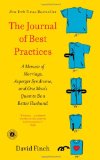A Memoir of Marriage, Asperger Syndrome, and One Man’s Quest to Be a Better Husband
by David Finch
Scribner, New York, 2012. 224 pages.
Starred Review
2012 Sonderbooks Stand-out: #5 Nonfiction: Personal Stories
This book is sweet. As an adult, David Finch was diagnosed as having Asperger’s Syndrome. It actually opened his eyes to why his marriage was falling apart. He began working on learning how to be a good husband, and kept a Journal of Best Practices.
He writes with plenty of humor. Some of the practices, wives might assume a husband would know without being told. I’m thinking of things like “Laundry: Better to fold and put away than to take only what you need from the dryer.” David Finch used his diagnosis to tackle things like that without blame and simply strive to be nicer for his wife to live with.
Here’s where he explains how the diagnosis helped:
Once I learned that I have Asperger syndrome, the fact that we’d had these serious marital problems seemed less surprising. Asperger syndrome can manifest itself in behaviors that are inherently relationship defeating. It’s tricky being married to me, though neither Kristen nor I could have predicted that. To the casual neurotypical observer (neurotypical refers to people with typically functioning brains, i.e., people without autism), I may seem relatively normal. Cognitive resources and language skills often develop normally in people with Asperger syndrome, which means that in many situations I could probably pass myself off as neurotypical, were it not for four distinguishing characteristics of my disorder: persistent, intense preoccupations; unusual rituals and behaviors; impaired social-reasoning abilities; and clinical-strength egocentricity. All of which I have to an almost comically high degree. But I also have the ability to mask these effects under the right circumstances, like when I want someone to hire me or fall in love with me.
Looking back, I suppose a diagnosis was inevitable. A casual girlfriend might have dismissed my compulsion to arrange balls of shredded napkin into symmetrical shapes as being idiosyncratic or even artistic. But Kristen had been living with me — observing me for years in my natural habitat — and had become increasingly skilled in assessing autism spectrum conditions in her job as a speech therapist….
Most people intuitively know how to function and interact with people — they don’t need to learn it by rote. I do. I was certain that with enough discipline and hard work I could learn to improve my behaviors and become more adaptable. While my brain is not wired for social intuition, I was factory-programmed to observe, analyze, and mimic the world around me. I had managed to go through school, get a good job, make friends, and marry — years of observation, processing, and trial and error had gotten me this far. And my obsessive tendencies mean that when I want to accomplish something I attack it with zeal. With my marriage in dire straits, I decided that even if I needed to make flash cards about certain behaviors and staple them to my face to make them become second nature, I was willing to do it.
Kristen didn’t know it, but that was what her life was about to become — her husband, with the best of intentions, stapling flash cards to his face. Okay, not to his face. And there were no staples involved. But flash cards? Definitely. Many people leave reminder notes for themselves: Pick up milk and shampoo, or Dinner with the Hargroves at 6:00. My notes read: Respect the needs of others, and Do not laugh during visitation tonight, and Do not EVER suggest that Kristen doesn’t seem to enjoy spending time with our kids.
I found two things particularly endearing about this book:
1) That he was willing to make so many changes to make life easier for his wife.
2) That his wife loved him despite the hugely egocentric life he was living before the diagnosis and that she never asked him to be perfect. (Some of his descriptions of what he was doing before are pretty outrageous. But she clearly loves him.)
This is a lovely and humorous story about two imperfect people, one exceedingly quirky, learning to live together with love and grace.
Find this review on Sonderbooks at: www.sonderbooks.com/Nonfiction/journal_of_best_practices.html
Disclosure: I am an Amazon Affiliate, and will earn a small percentage if you order a book on Amazon after clicking through from my site.
Source: This review is based on a library book from the Fairfax County Public Library.
Disclaimer: I am a professional librarian, but I write the posts for my website and blogs entirely on my own time. The views expressed are solely my own, and in no way represent the official views of my employer or of any committee or group of which I am part.
